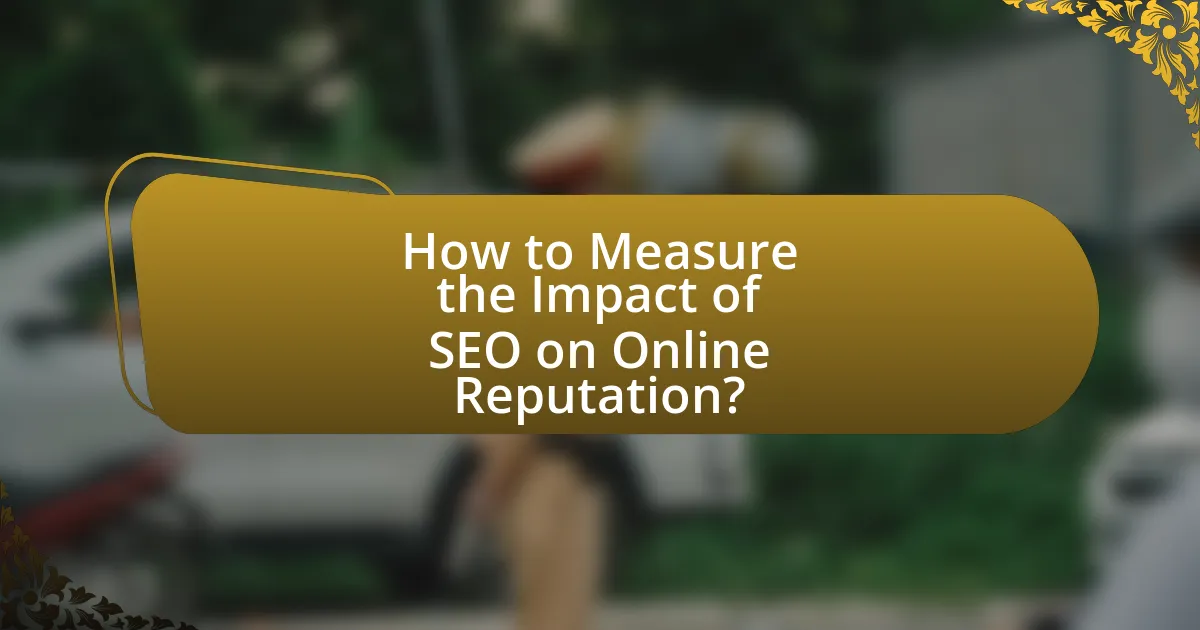The article examines the significant impact of SEO on online reputation, highlighting how search engine rankings influence public perception of brands and individuals. It discusses the key factors in SEO, such as keyword optimization, content quality, and user engagement, that shape online reputation management. The article also outlines effective content strategies to enhance SEO, including the creation of high-quality content, local SEO optimization, and leveraging user-generated content. Additionally, it addresses the importance of monitoring online reputation through metrics like sentiment analysis and provides practical tips for recovering from a damaged reputation. Overall, the article emphasizes the critical relationship between SEO and online reputation, offering insights for businesses to improve their visibility and credibility.

What is the Impact of SEO on Online Reputation?
SEO significantly influences online reputation by determining how a brand or individual is perceived through search engine results. High-ranking search results often lead to a positive perception, as users tend to trust the first few listings on search engines. Conversely, negative content appearing prominently can damage reputation. According to a study by Moz, 70% of users only click on the first page of search results, highlighting the importance of SEO in shaping public perception. Therefore, effective SEO strategies can enhance visibility and control over online narratives, ultimately impacting reputation management.
How does SEO influence online reputation management?
SEO significantly influences online reputation management by determining how a brand or individual appears in search engine results. When SEO strategies are effectively implemented, positive content is prioritized, pushing down negative or harmful information. For instance, a study by Moz indicates that 70% of users only click on the first page of search results, highlighting the importance of ranking high for favorable content. Therefore, optimizing content with relevant keywords, backlinks, and quality information can enhance visibility and shape public perception, ultimately protecting and improving online reputation.
What are the key factors in SEO that affect online reputation?
The key factors in SEO that affect online reputation include keyword optimization, content quality, backlinks, and user engagement metrics. Keyword optimization ensures that relevant terms are used effectively, making it easier for search engines to associate content with user queries. High-quality content builds trust and authority, which can positively influence public perception. Backlinks from reputable sites enhance credibility and improve search rankings, while user engagement metrics, such as click-through rates and time spent on page, signal to search engines that the content is valuable, further boosting reputation. These factors collectively shape how a brand is perceived online, impacting its overall reputation.
How do search engine rankings correlate with public perception?
Search engine rankings significantly influence public perception, as higher visibility in search results often leads to increased trust and credibility among users. Research indicates that 75% of users never scroll past the first page of search results, meaning that businesses or individuals appearing at the top are perceived as more authoritative and reliable. This correlation is further supported by a study from the Journal of Marketing Research, which found that consumers associate higher rankings with better quality and reputation. Consequently, effective SEO strategies that improve search rankings can enhance public perception and overall online reputation.
Why is online reputation important for businesses?
Online reputation is crucial for businesses because it directly influences consumer trust and purchasing decisions. A positive online reputation can lead to increased customer loyalty, higher sales, and improved brand perception. According to a survey by BrightLocal, 87% of consumers read online reviews for local businesses, and 73% trust a business more if it has positive reviews. This demonstrates that a strong online reputation not only attracts new customers but also retains existing ones, ultimately impacting a business’s bottom line.
What role does online reputation play in consumer decision-making?
Online reputation significantly influences consumer decision-making by shaping perceptions of trust and credibility. Research indicates that 84% of consumers trust online reviews as much as personal recommendations, highlighting the importance of a positive online presence. Additionally, a study by BrightLocal found that 91% of consumers read online reviews, and 68% form an opinion after reading just one to six reviews. This data underscores how a strong online reputation can lead to increased consumer confidence, ultimately affecting purchasing behavior.
How can a negative online reputation impact a business’s bottom line?
A negative online reputation can significantly reduce a business’s bottom line by decreasing customer trust and leading to lost sales. When potential customers encounter negative reviews or unfavorable information online, they are less likely to engage with the business, resulting in a direct decline in revenue. According to a study by BrightLocal, 87% of consumers read online reviews for local businesses, and 79% trust online reviews as much as personal recommendations. This indicates that a negative reputation can deter a substantial portion of potential customers, ultimately impacting profitability. Additionally, businesses may incur higher marketing costs to counteract negative perceptions, further straining financial resources.

What Content Strategies Enhance SEO for Online Reputation?
Content strategies that enhance SEO for online reputation include creating high-quality, relevant content, optimizing for local SEO, and leveraging user-generated content. High-quality content that addresses user needs and incorporates targeted keywords improves search engine rankings, making it easier for potential customers to find positive information. Optimizing for local SEO, such as including location-based keywords and creating Google My Business listings, helps businesses appear in local search results, which is crucial for reputation management. Additionally, user-generated content, such as reviews and testimonials, not only builds trust but also contributes to SEO by providing fresh, relevant content that search engines favor. These strategies collectively improve visibility and shape a positive online reputation.
How can content marketing improve SEO and online reputation?
Content marketing improves SEO and online reputation by creating high-quality, relevant content that attracts organic traffic and builds trust with audiences. When businesses produce valuable content, they increase their chances of ranking higher in search engine results, as search engines prioritize content that answers user queries effectively. For instance, according to a study by HubSpot, companies that blog receive 97% more links to their websites, which enhances their domain authority and improves SEO rankings. Additionally, consistent content marketing fosters a positive online reputation by establishing the brand as an authority in its field, leading to increased customer loyalty and positive reviews. This dual impact of enhanced visibility and credibility ultimately strengthens both SEO performance and online reputation.
What types of content are most effective for building a positive online reputation?
High-quality, informative content is most effective for building a positive online reputation. This includes blog posts, articles, and guides that provide valuable insights and solutions to the audience’s problems. Research indicates that 70% of consumers prefer to learn about a company through articles rather than advertisements, highlighting the importance of informative content in shaping perceptions. Additionally, user-generated content, such as reviews and testimonials, significantly enhances credibility and trust, as 79% of consumers trust online reviews as much as personal recommendations. Engaging multimedia content, like videos and infographics, also plays a crucial role, as they can increase user engagement and shareability, further amplifying a positive reputation.
How often should content be updated to maintain SEO effectiveness?
Content should be updated at least every six months to maintain SEO effectiveness. Regular updates signal to search engines that the content is current and relevant, which can improve rankings. According to a study by HubSpot, websites that regularly update their content see a 55% increase in website traffic. Additionally, Google’s algorithm favors fresh content, making timely updates crucial for maintaining visibility in search results.
What are the best practices for creating reputation-focused content?
The best practices for creating reputation-focused content include ensuring accuracy, maintaining transparency, and engaging with the audience. Accuracy is crucial as it builds trust; for instance, a study by the Pew Research Center found that 64% of Americans believe that misinformation is a major problem in society. Transparency involves openly sharing sources and methodologies, which enhances credibility. Engaging with the audience through comments and social media fosters a sense of community and responsiveness, which is vital for reputation management. Additionally, optimizing content for search engines ensures that positive information ranks higher, thereby influencing public perception effectively.
How can storytelling be used to enhance brand reputation through content?
Storytelling can enhance brand reputation through content by creating emotional connections with the audience, fostering trust and loyalty. When brands share authentic narratives that resonate with their target demographic, they can effectively communicate their values and mission, which strengthens their reputation. For instance, a study by the Content Marketing Institute found that 70% of consumers prefer to learn about a company through articles rather than advertisements, indicating that storytelling can engage audiences more effectively than traditional marketing methods. Additionally, brands that utilize storytelling often see increased customer engagement, as narratives can make complex information more relatable and memorable, further solidifying their reputation in the market.
What role do user-generated content and reviews play in SEO strategies?
User-generated content and reviews significantly enhance SEO strategies by improving search engine rankings and increasing organic traffic. Search engines prioritize fresh, relevant content, and user-generated content provides a continuous stream of new material that can improve a website’s visibility. Additionally, reviews contribute to local SEO by generating keywords and phrases that potential customers search for, thus increasing the likelihood of appearing in search results. According to a study by BrightLocal, 87% of consumers read online reviews for local businesses, indicating that positive reviews can enhance credibility and attract more visitors. This interplay between user-generated content, reviews, and SEO is crucial for building an online reputation and driving engagement.

How to Measure the Impact of SEO on Online Reputation?
To measure the impact of SEO on online reputation, analyze key performance indicators (KPIs) such as organic search rankings, website traffic, and sentiment analysis. Organic search rankings indicate how well a brand is positioned in search results, which directly affects visibility and perception. Increased website traffic from search engines suggests improved brand awareness and interest, while sentiment analysis of online mentions and reviews provides insights into public perception. According to a study by Moz, 70% of consumers trust online reviews as much as personal recommendations, highlighting the importance of managing online reputation through effective SEO strategies.
What metrics should be tracked to assess online reputation through SEO?
To assess online reputation through SEO, key metrics to track include organic search rankings, brand mentions, sentiment analysis, backlinks, and website traffic. Organic search rankings indicate how well a brand is positioned in search results, directly impacting visibility and reputation. Brand mentions across various platforms reflect public perception and awareness, while sentiment analysis evaluates the tone of these mentions, providing insight into overall reputation. Backlinks serve as endorsements from other sites, enhancing credibility, and website traffic metrics reveal user engagement and interest levels. Collectively, these metrics provide a comprehensive view of a brand’s online reputation and its evolution over time.
How can sentiment analysis be utilized to gauge public perception?
Sentiment analysis can be utilized to gauge public perception by systematically analyzing text data from various sources such as social media, reviews, and news articles to determine the emotional tone expressed. This method quantifies sentiments as positive, negative, or neutral, allowing organizations to understand how their brand, products, or services are perceived by the public. For instance, a study by Liu (2012) in “Sentiment Analysis and Opinion Mining” highlights that sentiment analysis can reveal trends in consumer opinions, enabling businesses to adjust their marketing strategies accordingly. By leveraging sentiment analysis, companies can effectively monitor public sentiment over time, identify potential issues, and enhance their online reputation through targeted content strategies.
What tools are available for monitoring online reputation and SEO performance?
Tools available for monitoring online reputation and SEO performance include Google Analytics, SEMrush, Moz, Ahrefs, and Brand24. Google Analytics provides insights into website traffic and user behavior, allowing businesses to assess their online presence. SEMrush offers comprehensive SEO tools, including keyword tracking and site audits, which help in evaluating search engine performance. Moz specializes in tracking domain authority and backlinks, essential for understanding SEO effectiveness. Ahrefs is known for its robust backlink analysis and keyword research capabilities, aiding in reputation management through SEO strategies. Brand24 focuses on social media monitoring and sentiment analysis, enabling businesses to track their online reputation in real-time. These tools collectively provide valuable data and insights necessary for effective online reputation management and SEO performance evaluation.
What are common challenges in aligning SEO with online reputation management?
Common challenges in aligning SEO with online reputation management include conflicting objectives, resource allocation, and measurement difficulties. SEO focuses on optimizing content for search engines to increase visibility, while online reputation management aims to shape public perception and mitigate negative feedback. These differing goals can lead to tension in strategy development. Additionally, both disciplines often compete for the same resources, making it challenging to prioritize initiatives effectively. Measurement of success also poses a problem, as SEO metrics like traffic and rankings do not always correlate with reputation metrics such as sentiment analysis or brand perception.
How can businesses overcome negative SEO impacts on their reputation?
Businesses can overcome negative SEO impacts on their reputation by actively managing their online presence through reputation monitoring, content creation, and backlink management. Reputation monitoring involves regularly checking search engine results and social media platforms for negative mentions, allowing businesses to respond promptly. Creating high-quality, positive content that showcases the brand’s values and strengths can help push down negative search results. Additionally, managing backlinks by disavowing harmful links and building relationships with reputable sites can improve overall SEO health. According to a study by Moz, 70% of consumers trust online reviews as much as personal recommendations, highlighting the importance of maintaining a positive online image.
What strategies can be employed to recover from a damaged online reputation?
To recover from a damaged online reputation, individuals and businesses should implement a multi-faceted strategy that includes monitoring online presence, creating positive content, and engaging with the audience. Monitoring involves using tools like Google Alerts and social media monitoring platforms to track mentions and sentiment. Creating positive content entails publishing articles, blog posts, and press releases that highlight achievements and positive aspects, which can help push down negative search results. Engaging with the audience through social media and responding to reviews fosters a positive image and builds trust. According to a study by the Reputation Institute, 70% of consumers are influenced by online reviews, emphasizing the importance of actively managing online reputation through these strategies.
What practical tips can enhance SEO for better online reputation?
To enhance SEO for better online reputation, focus on creating high-quality, relevant content that addresses user needs and incorporates targeted keywords. This approach improves search engine rankings and increases visibility, which is crucial for shaping a positive online reputation. Additionally, optimizing meta tags, including title tags and meta descriptions, ensures that search engines accurately represent your content, further attracting clicks.
Engaging with users through social media and responding to reviews can also boost your online presence, as active engagement signals credibility and trustworthiness to both users and search engines. According to a study by Moz, 70% of consumers trust online reviews as much as personal recommendations, highlighting the importance of managing online feedback effectively.
Furthermore, building backlinks from reputable sites enhances domain authority, which is a significant factor in SEO rankings. Research from Ahrefs indicates that websites with a higher number of quality backlinks tend to rank better in search results. By implementing these strategies, you can significantly improve your SEO and, consequently, your online reputation.

Leave a Reply